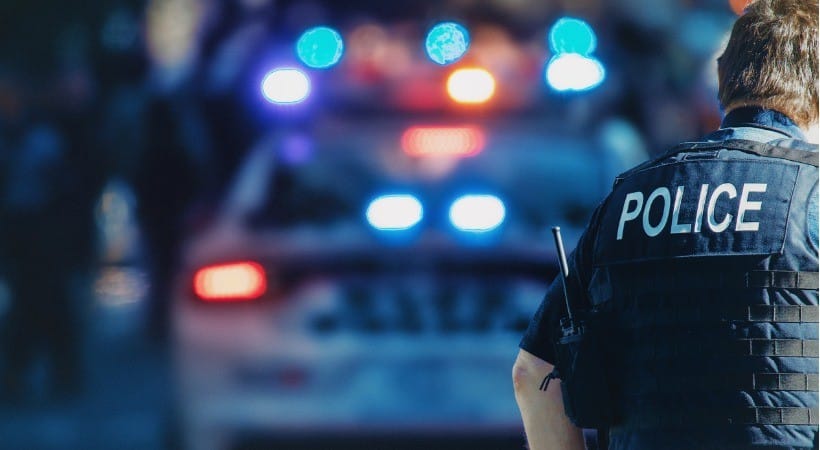The hidden link between first responders and addiction has slowly been brought to light. It’s time for us to take a deeper look into this addiction connection.
First responders are tasked with protecting the health and safety of our nation’s inhabitants. Putting their lives on the line comes with the job, but in terms of their mental health, who watches out for them?
Firefighters, police, emergency medical technicians (EMTs), and paramedics are exposed to dangerous situations and conditions. When there’s a fire, an accident, a natural disaster, or a terror attack, they’re on the scene.
Adding to the drama and trauma, they work irregular shifts and sometimes for very long hours. Sleep deprivation results. First responders also endure physical hardships while seeing death, injury, pain, and grief on the job.
Depression, stress, post-traumatic stress disorder (PTSD), and sometimes even suicidal thoughts are not unusual among first responders. The hardship and heartache can make them more prone to substance use disorder and addiction.
Reasons for Addiction in First Responders
There’s no set of circumstances that guarantee that someone will develop a substance use disorder. A tense, dangerous, or unstable environment is one factor, however.
An estimated 30% of first responders experience depression and PTSD, compared to 20% of the general population.
When first responders are called away from home to help with disasters, they may work long hours in an unfamiliar area. That can lead to fatigue and dissatisfaction. Other stressors include:
- A lack of enough information
- A lack of communication among agencies (both during and after the incident)
- Unfamiliar or conflicting duties
- Interactions with survivors, victims and/or their family, or children
- Excessive exposure to death or injury
- Environmental hazards
- Injuries of first responders
- Unsafe working conditions (or conditions that could be made safer)
- Poor leadership
Good leadership and camaraderie seem to reduce the likelihood of PTSD. A plan of action — and involving first responders in its development — plus extra training also help. More realistic expectations from leadership might ease some stress too.
Addiction and Police Officers
Police are susceptible to a number of kinds of stress.
One study found about 75% of surveyed officers admitted to experiencing some kind of traumatic event, but the majority did not report it. Half of responding officers said they personally knew fellow law enforcement who were profoundly changed after experiencing trauma. Half also said they knew an officer who had committed suicide.
Depression appears common among police. After September 11, 2001:
- Nearly one-fourth admitted to experiencing depression
- Nearly half said they suffered from depression and anxiety
- 11% said they had PTSD
Apart from September 11 responders, more than a third of police experienced PTSD when health problems prevented them from working. Women (15.5%) were more negatively affected than male law enforcement peers (10.3%), possibly from higher social pressures that come with working in a male-dominated profession.
After disasters such as Hurricane Katrina, many police said they drank heavily and binged alcohol. (Binge drinking is when a man consumes five or more drinks on one occasion, or four for a woman. Heavy drinking is when someone has binged five or more times in the past 30 days.)
One study found that before Hurricane Katrina, responders consumed an average of two drinks a day. After the hurricane, consumption skyrocketed to seven drinks daily.
Approximately 23.1% of male and 25% of female officers also admitted to considering suicide. The death rate for law enforcement was higher overall compared to the general public. Job strain, depression, anger, and burnout are all thought to play a part. Do you have questions or concerns? Our intake coordinators will answer them.

Are you or your loved one suffering from addiction?
Addiction and Firefighters
Firefighters are repeatedly exposed to intense and painful experiences. Erratic sleep cycles aren’t unusual. All can impact mental health.
Volunteer firefighters face their own challenges to getting therapy because of cost, trouble getting time off work, as well as limited resources compared to full-time firefighters and the general population.
The National Fire Protection Association estimates that as of 2018, the United States had an estimated 1.115 million career and volunteer firefighters. Of that number:
- 370,000 (33%) were career firefighters
- 745,000 (67%) were volunteers
- 93,700 (8%) of all U.S. firefighters were female
- 15,200 (4%) of career firefighters and 78,500 (11%) of volunteers were female
Volunteer firefighters are hit harder by depression –16.85% suffer from it, compared to 13.06% of career firefighters.
Female volunteer firefighters also have a higher risk of depression — 38.5% compared to 22.2% of career female firefighters. That could be because they face additional social pressures, harassment, and possible discrimination in a predominantly male profession.
PTSD — which is more common among career firefighters, whereas post-traumatic stress more commonly plagues volunteers — may be a key factor to career firefighters’ higher rates of alcohol use.
Nearly half of male firefighters admitted to binge or heavy drinking. Another study found more than 60.5% of female firefighters drank heavily, and 39.5% binged alcohol. That’s compared to 12-15% of the general female population.
Other studies also have found high rates of alcohol use and abuse among firefighters. In terms of suicide, firefighters were more prone to consider or attempt it.
Addiction and Paramedics/EMTs
Emergency services personnel also have a hectic work pace. They’re usually the first ones called during emergencies, and the nature of their jobs pretty much keeps them in the thick of things.
Their quick response during crisis situations can often mean the difference between life and death. It can be rewarding work in that they’re saving lives, but it can also be draining.
More than two-thirds (69%) of EMS professionals don’t get enough time to recover after a traumatic event, because they’re soon called to respond to something else. The results are greater feelings of depression, stress, PTSD, suicidal thoughts, and other problems.
Treating Addiction and Emergency Responders
Treating addiction is always multifaceted. Looking at causes, many things can contribute to the condition. Genetics is a factor. How old someone was the first time they tried drugs or alcohol is another. It can also be one’s environment. Conversely, managing that environment can help.
First responders face intense, dangerous, emotionally charged situations while working irregular schedules and/or long hours. No one can predict when a fire, flood, or other danger will occur. One can only predict that it will happen.
On the work front, that means added preparedness. It could help to plan for what may be. Solid leadership and cooperation could also help. Reducing on-the-job risks and trying to prevent burnout and fatigue may further minimize PTSD, depression, and other resulting conditions.
Following up after the fact, and providing therapy, treatment, and peer support may also prove beneficial.
In cases where there is a problem or potential problem, workplaces that offer Employee Assistance Programs (EAPs) that provide counseling and/or assist in finding someone substance use disorder treatment can also be immensely helpful.
Addiction and emergency responders may be more common bedfellows than addiction and the general public, but lessening the stigma of mental illness within the first responder ranks is a solid first step.
Having a plan before disaster strikes, so the household, family, and pets are cared for — not having to worry about that will ease some of the burden. A buddy system also helps. Confiding in a colleague, offering support, and watching out for one another’s safety can make bad situations better.
Self-care is crucial. The following are recommended:
- Try to avoid working shifts longer than 12 hours
- Open up about feelings to family, friends, supervisors, and teammates
- Eat healthy foods, get enough sleep, and exercise
- Limit alcohol and caffeine
Understand that it’s okay to say no to too much work, or yes to getting help.
Sources
- samhsa.gov – First Responders: Behavioral Health Concerns, Emergency Response, and Trauma
- niaaa.nih.gov – Drinking Levels Defined
- nfpa.org – U.S. Fire Department Profile
- jscimedcentral.com – Perceptions of Alcohol Use Among U.S. Firefighters
- drugabuse.gov – How Can the Workplace Play a Role in Substance Use Disorder Treatment?
- usfa.fema.gov – Preventing Suicide Among First Responders
- cdc.gov – Emergency Responders: Tips for Taking Care of Yourself
Medical disclaimer:
Sunshine Behavioral Health strives to help people who are facing substance abuse, addiction, mental health disorders, or a combination of these conditions. It does this by providing compassionate care and evidence-based content that addresses health, treatment, and recovery.
Licensed medical professionals review material we publish on our site. The material is not a substitute for qualified medical diagnoses, treatment, or advice. It should not be used to replace the suggestions of your personal physician or other health care professionals.






